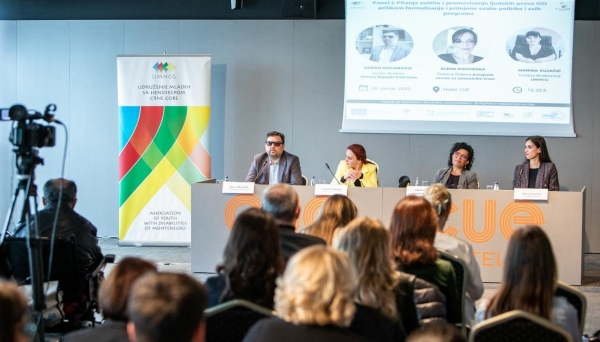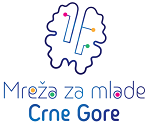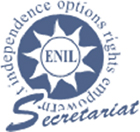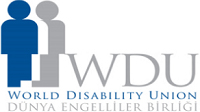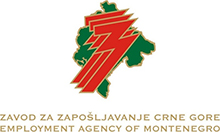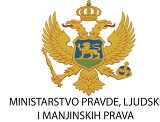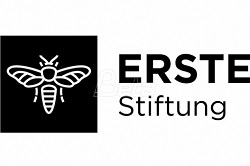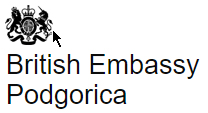Representatives of state institutions to consult PWD organizations in the early stages of policy making
Podgorica, PR Press Service – Representatives of state institutions consult organizations of persons with disabilities (PWDs) at a late stage when creating policies and only to satisfy the form, it was announced in the second part of the Forum on the rights of PWDs of the Association of Youth with Disabilities of Montenegro (AYDM).
The Executive Director of the Union of the Blind of Montenegro Goran Macanović pointed out at the panel Protection and promotion of the human rights of persons with disabilities during the formulation and implementation of each policy and all programs that many provisions of the Convention on the Rights of Persons with Disabilities are not applied in practice.
„The obligation of direct and continuous consultation with PWDs through their organizations is insufficiently implemented. Consulting here in Montenegro is often absent in the early stages of the creation of some policies. “It often happens that PWD representatives are invited to participate in some process that is nearing its end, and often this participation is only to satisfy the form, and not to essentially obtain quality from the representatives of organizations of persons with disabilities (OPDs),“ said Macanović.
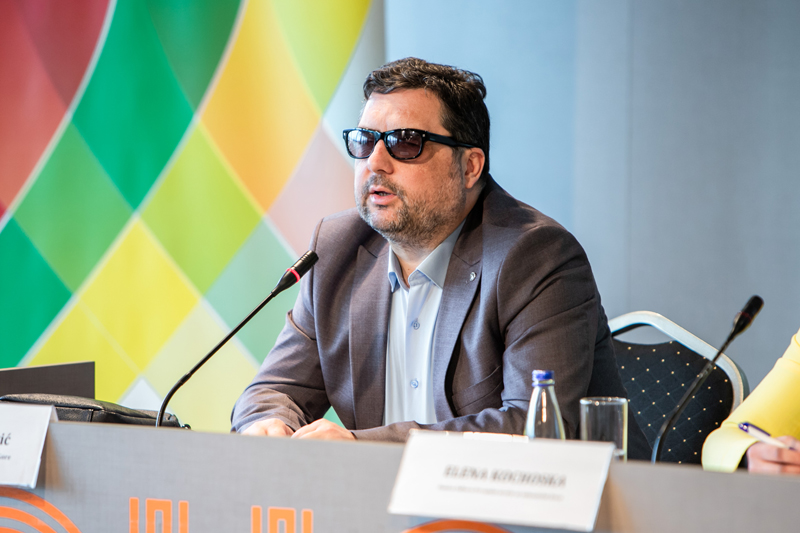
He said that even when representatives of OPDs make proposals, it often happens that the institutions do not accept them, stating that it is most often because the representatives of the institutions do not understand them.
„It often happens that the representatives of the institutions do not accept our solutions and proposals because, according to them, it requires large financial resources, but it often happens that it is only the assumption of individuals, without the necessary analyzes that would support such claims,“ said Macanović.
He pointed out that the protection and promotion of PWDs is often affected by administrative obstacles and barriers that institutions present to PWDs.
„In the protection and promotion of the rights of PWDs, the PWD movement plays an important role. It is very important and necessary that through our participation in various processes, in the creation and implementation of policies in all areas, we promote an approach based on human rights,“ Macanović pointed out, stating that he sees the role of OPDs as one that will monitor the implementation of policies and suggest possible changes.
Member of the Board of the European Network on Independent Living Elena Kochoska said that the provisions of the Convention on the Rights of Persons with Disabilities are not being implemented.
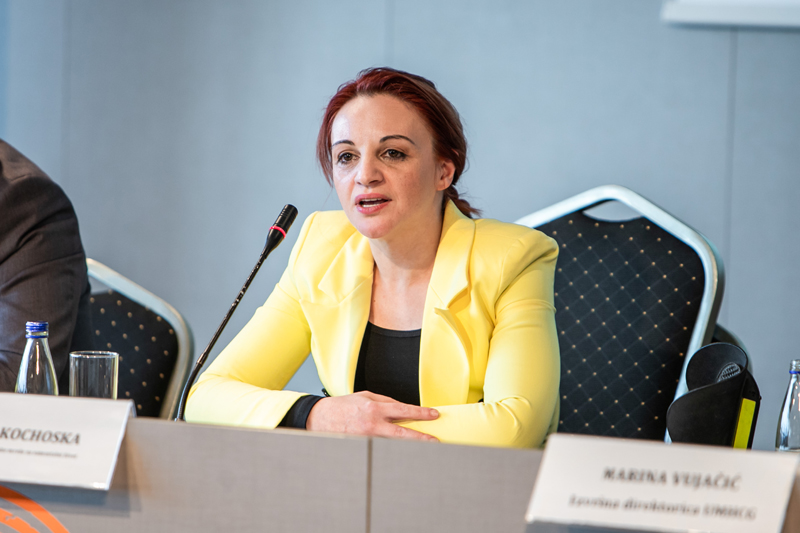
„When it comes to that Convention, it is difficult to implement certain provisions because it is said that systemic, cultural, social, infrastructural changes are needed. I do not mean only architectural solutions and barriers, but we are talking about opinions, attitudes, life, values created by the community of those who do not have disabilities. This Convention requires something else. Rehabilitation of the system of values and standards is needed, and that should be done by the community without disabilities, not by us. That’s where the problem lies,“ said Kochoska.
According to her, the key goal prescribed by this Convention is an independent life that respects the autonomy, dignity, and diversity of PWDs.
„The process of creating public policy sees the issue of disability as something separate. This led to a split in approaches. It is important to understand this as a barrier on the part of the state and those in positions of power. The terminology itself contributes to classification, categorization. It is one of the tools that the state uses against the implementation of the Convention,“ said Kochoska.
The Convention, as she explained, requires that equality be based on the principle of inclusiveness, stressing that all laws must be based on that principle.
Executive Director of the AYDM Marina Vujačić said that if OPDs do not have principles when acting and advocating, others will not appreciate them, nor will they respect their opinion.
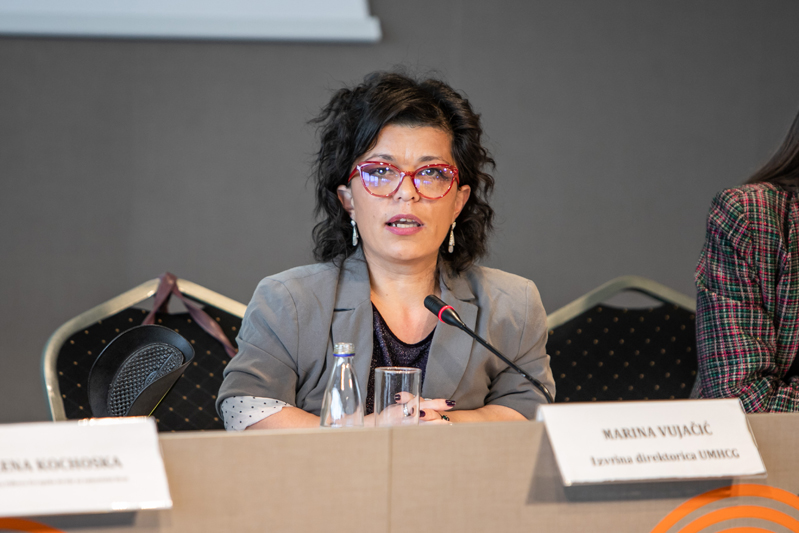
„I consider that very important in the field of human rights advocacy, but that does not mean that we have solutions and that we should offer them in every situation. Government representatives must consult us, ask and respect what we consider important and necessary,“ said Vujačić.
According to her, representatives of OPDs should have arguments and not use other methods that are more acceptable to the other side.
„Some results are felt only in five or ten years. It is important that we never give up on them and that they are very important to us. It is also important that all of this is accompanied by permissible pressure, as well as that we do not give up on what we are advocating and asking for, and that all of this is accompanied by life experiences and facts, that is, arguments,“ said Vujačić.
During the discussion, the representative of the Europe Now Movement (Pokret Evropa sad) Branka Marković who is a teacher, pointed out that it is necessary to pay more attention to children with disabilities at school.
„A subject should be introduced through the curriculum so that this issue is represented, so that peers and teachers know how they should behave towards children with disabilities“, Marković believes.
Vujačić replied that there is no inclusive education in Montenegro, pointing out that a large number of children with disabilities graduate from secondary vocational school, but not from high school, due to the inaccessibility of the program.
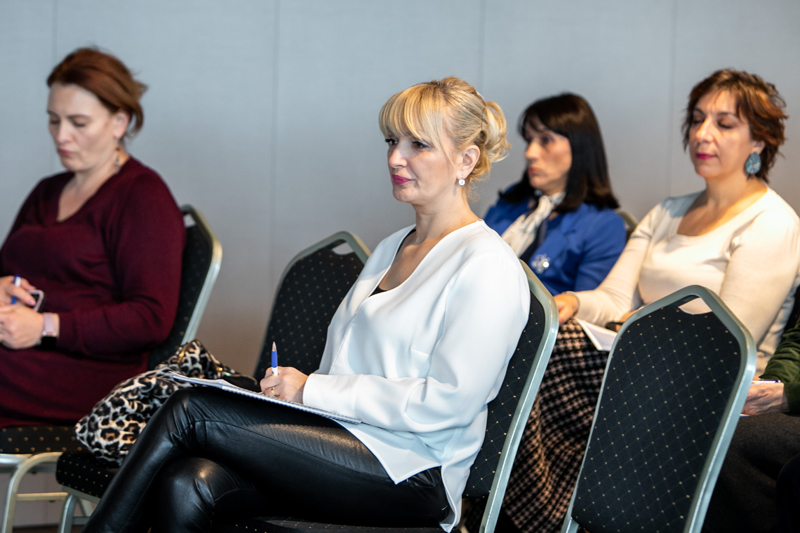
She pointed to the example of only one faculty that adapted the program to a student with autism.
The representative of the For the Future of Podgorica (Za budućnost Podgorice) coalition, Dr. Jelena Borovinić Bojović, said that reforms exist when it comes to policies concerning human rights, but they are slow.
„I believe that we all have to make a personal contribution to the inclusion of PWDs.” I support the idea of independent living. It would be nice if, in the future local government in Podgorica, we could achieve closer communication with AYDM in terms of opening a day center, as a space that would serve the needs of AYDM and all other PWDs, young and old, with a more diverse program, including art,” said Borovinić Bojović.
The participants of the discussion also announced that until now populist measures have been applied when it comes to policy towards PWDs, as well as that a systemic approach to solving the problem is needed.
During the panel Importance of inclusion of PWDs and PWDs organizations in the process of monitoring, creating, drafting implementing and evaluation of policies in the field of PWDs rights, Kochoska said that according to the Convention on the Rights of PWDs, states have an obligation to design mechanisms for monitoring, explaining that they must be financial independent, to include PWDs and to cooperate with various PWD organizations.
„In Macedonia, monitoring mechanisms are entrusted to the Ombudsman, but not as independent bodies, but as bodies within a department within that institution. The staff working there have no knowledge of the Convention. For four years, we have had a monitoring mechanism on paper, but in reality we have nothing“, said Kochoska.
She pointed out that states must finance organizations that deal with advocacy, monitoring, because that process requires a lot of energy, skills and education.
„In practice, we do not have positive experiences with that as far as the region is concerned and the state does not finance monitoring“, said Kochoska.
She pointed out that organizations should be more pervasive and an integral part of meetings when committees write country reports.
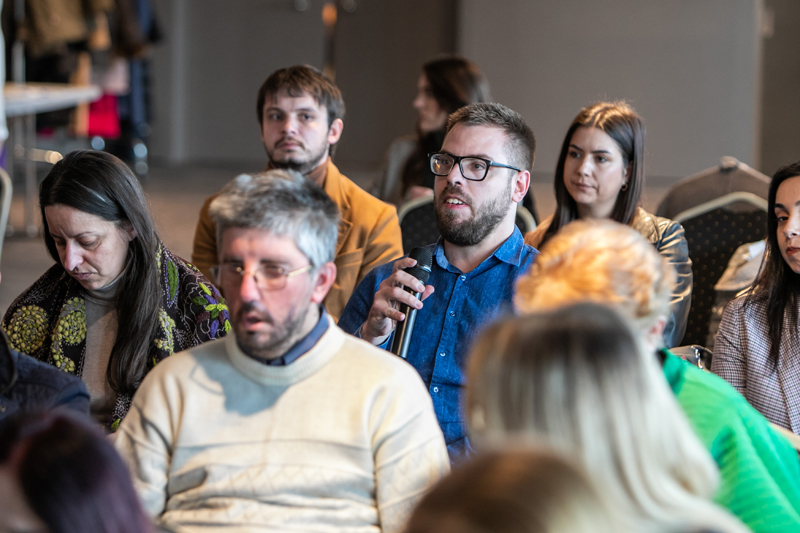
Vujačić said that it is unthinkable to talk about any monitoring of policies, after the adoption of the report, if there are no quality reports on their implementation, including independent reports.
She reminded that the AYDM prepared many reports from the shadows, stating that the first significant one was the Alternative Report on the Implementation of the Convention that they submitted to the Committee in 2017.
„These reports are important to put what we have been doing for years on paper and to use later as a mechanism and as advocacy and some other activities both within organizations and within public action. I was proud of myself and my colleagues who participated in the preparation of the Report because the members of the Committee told us that it was one of the highest quality reports they had received,” said Vujačić.
During the discussion, the President of the Umbrella organization of PWDs in Croatia Marica Mirić said that the organizations do not use their civility to a sufficient extent, stating that they are not united and are divided in the fight for human rights.
„When it comes to monitoring, it is important that we devote ourselves to strategic documents, whatever they may be, in order to monitor the monitoring of the provisions of the Convention,“ Mirić believes.
The Forum is organized as part of the program of CSOs in Montenegro – from basic services to policy formulation – M’BASE, which is implemented by the Center for Civic Education (CGO) in partnership with the German Friedrich Ebert Foundation (FES), the NGO Center for the Protection and Study of Birds of Montenegro (CZIP) and the NGO Politikon network. The project is financed by the European Union and co-financed by the Ministry of Public Administration of Montenegro.



More news
- The Employment Agency of Montenegro continues to undermine the field of professional rehabilitation and employment of persons with disabilities through illegal actions
- THE AYDM CONDUCTED A RESEARCH ON THE ASSESSMENT OF COMPETENCIES AND EXISTING KNOWLEDGE OF PERSONS WITH PHYSICAL DISABILITIES IN THE FIELD OF DIGITAL MARKETING IN MONTENEGRO
- Portal Disability info i aktuelnosti
- AYDM ARE IMPLEMENTATING THE PROJECT DIGITAL MARKETING CAPACITY BUILDING - EMPOWERING PERSONS WITH PHYSICAL DISABILITIES FOR REMOTE WORK
- European Day on Independent Living marked in Montenegro: Right on Independent Living as Right to Freedom and Choice











